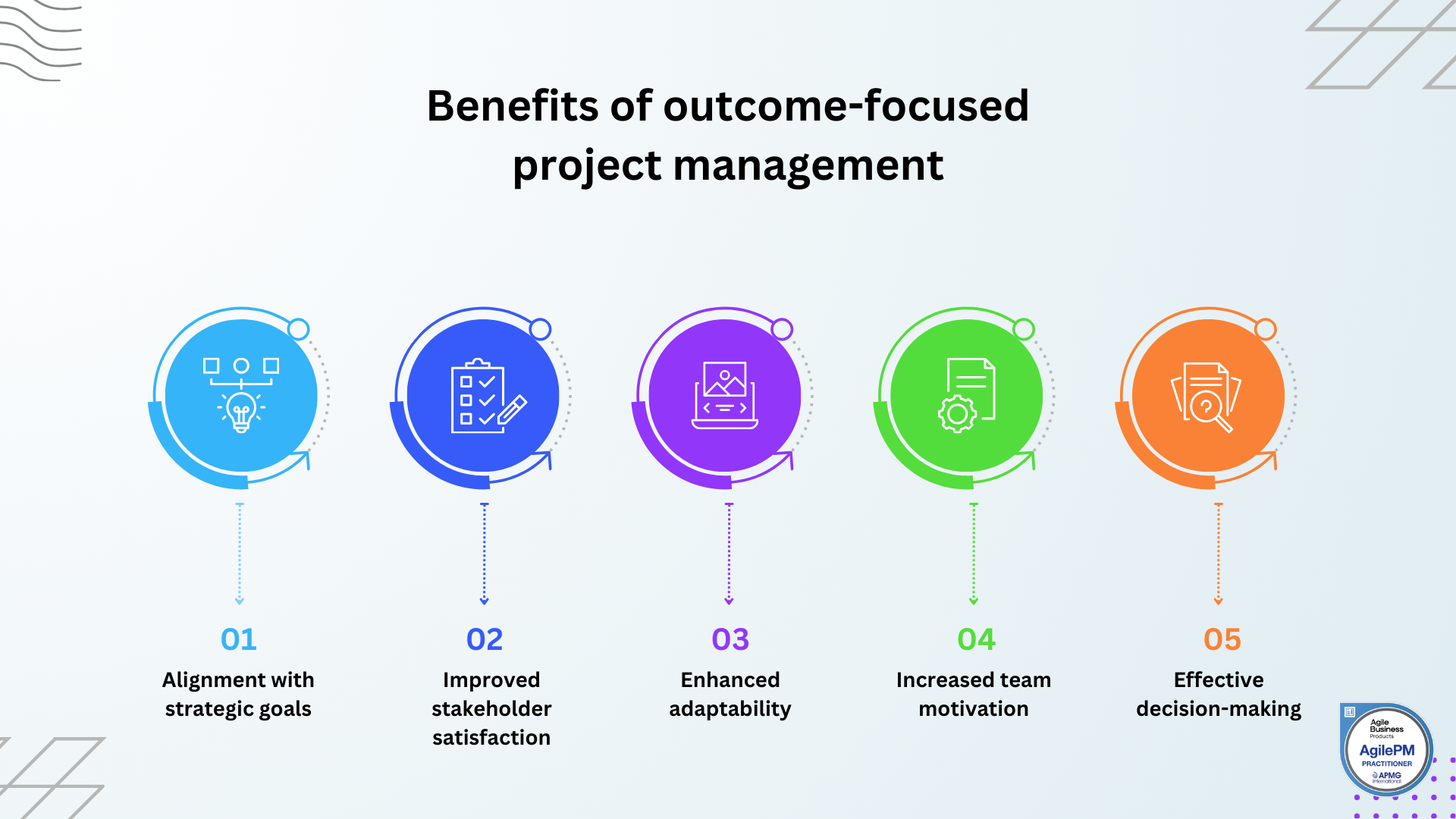Let’s imagine you're leading a project. Your team is ticking off tasks, meeting deadlines, and everything seems to be on track. But at the end of the project, the client isn't happy, the stakeholders are disappointed, and the project doesn't deliver the impact you expected. What went wrong?
This is a story so many project managers know too well. We get caught up in the checklists, deadlines, and deliverables, but in the rush to “get it done,” we forget the bigger picture. Success isn’t just about finishing tasks, it’s about creating real value that makes a difference. In today’s fast-moving, constantly shifting world, especially in agile environments, the true win comes when your project doesn’t just end, but delivers real, lasting value and impact. This is the true measure of success.

Why outcomes matter in agile project management
"In AgilePM, the focus on outcomes is a key innovation that sets it apart from many other project management frameworks, which often focus primarily on outputs. The agile way of working is designed to be flexible, responsive, and centred around delivering continuous value. However, if the team is only concerned with finishing tasks, the true potential of agility is lost.
Outcomes in agile project management are about ensuring that every sprint, every user story, and every piece of work contributes to the broader goals of the project and the organisation. These outcomes should align with the strategic objectives of the business, ensuring that the project is not just a series of completed tasks, but a journey towards delivering real, tangible value.
To understand the power of focusing on outcomes in agility, let’s examine some real-world examples where this approach led to significant success.
A global retailer embarked on a digital transformation project to improve its online shopping experience. The project was managed using agile project management principles, with the goal of enhancing customer satisfaction. Instead of focusing on just building a new website (an output), the team focused on the outcome—improving customer retention and increasing online sales.

By prioritising customer feedback and iteratively refining the shopping experience, the retailer achieved a 20 per cent increase in online sales and a 15 per cent improvement in customer retention. The focus on outcomes rather than just outputs made the difference between a functional website and a platform that drove significant business value.
The benefits of outcome-focused agile project management
Focusing on outcomes rather than just outputs brings several benefits, especially in agile project management:
-
Alignment with strategic goals: Outcome-focused management ensures that every sprint and every deliverable is aligned with the organisation’s strategic goals. This alignment is crucial in ensuring that the project contributes to the overall success of the business.
-
Enhanced stakeholder satisfaction: Stakeholders are more likely to be satisfied when they see that the project is delivering real value, and not just that tasks are being completed. By focusing on outcomes, you ensure that the project meets the expectations of all stakeholders.
-
Improved decision-making: When the focus is on outcomes, teams can make better decisions about prioritising work, allocating resources, and managing risks. This leads to more efficient and effective project management.
-
Increased team motivation: Teams are more motivated when they understand how their work contributes to the broader goals of the organisation. Focusing on outcomes gives them a clear sense of purpose and the satisfaction of knowing their efforts are making a difference.
-
Enhanced adaptability: Focusing on outcomes allows teams to remain flexible, quickly adjusting to changes and ensuring the project stays aligned with evolving goals.

Shifting from task-focused to outcome-focused management
Transitioning to an outcome-focused approach in agile project management requires a shift in mindset. Here are some practical steps to make this transition:
-
Start with clear outcomes: At the beginning of each sprint or project, you should clearly define the desired outcomes. These should be specific, measurable, and directly aligned with business objectives.
-
Communicate the vision: Ensure that the entire team understands the importance of these outcomes. Regularly communicate how their work contributes to these goals and why it matters.
-
Prioritise Outcomes Over Tasks: Focus on tasks that directly contribute to the desired outcomes. Be flexible and willing to adjust the project scope if necessary to ensure that the outcomes are achieved.
-
Measure Success by Outcomes. Instead of measuring success by the number of completed tasks, measure it by the impact of those tasks. Use metrics that track progress towards the desired outcomes.
In agile project management, the true success of a project isn’t measured by the number of tasks completed or the speed of delivery. It’s measured by the value the project brings to the organisation and its stakeholders, and the impact it has. By focusing on outcomes rather than just outputs, you can ensure that your projects deliver real value, meet business goals, and satisfy all stakeholders.
Ready to shift your focus from tasks to outcomes? Discover how AgilePM v3 can help you deliver real value in every project. Sign up now!
Please note blogs reflect the opinions of their authors and do not necessarily reflect the recommendations or guidance of the Agile Business Consortium.
